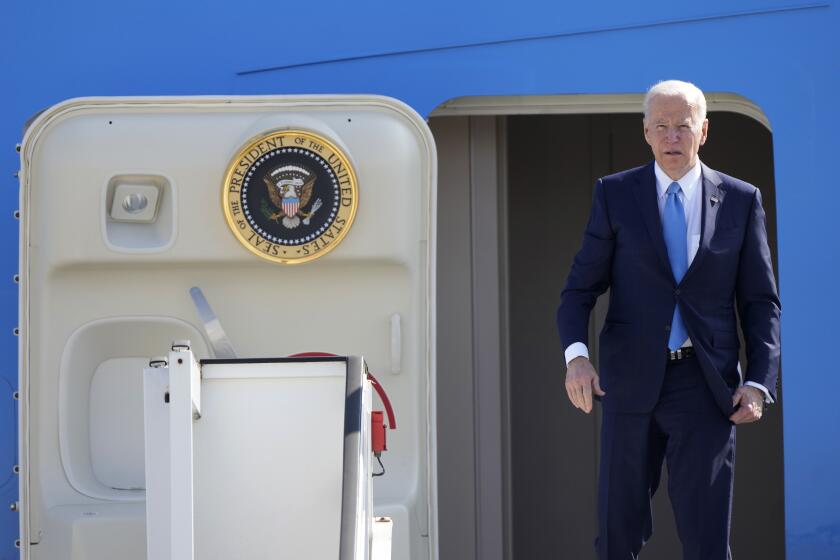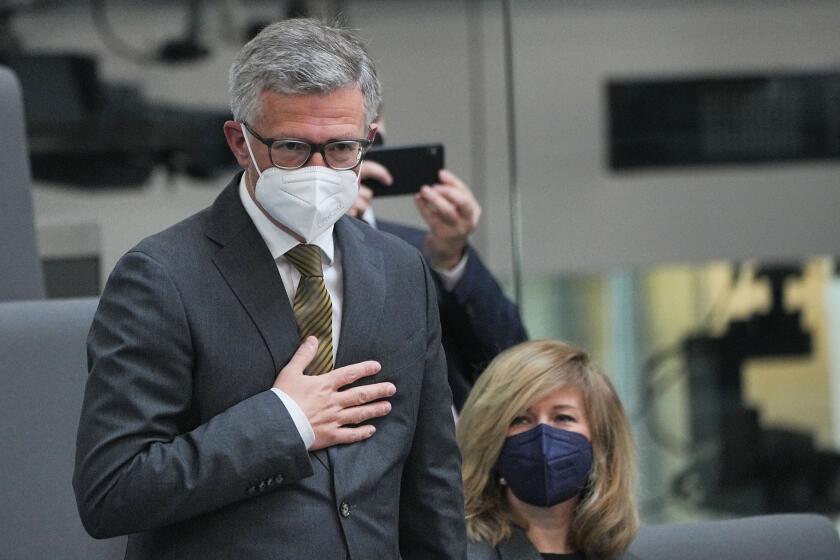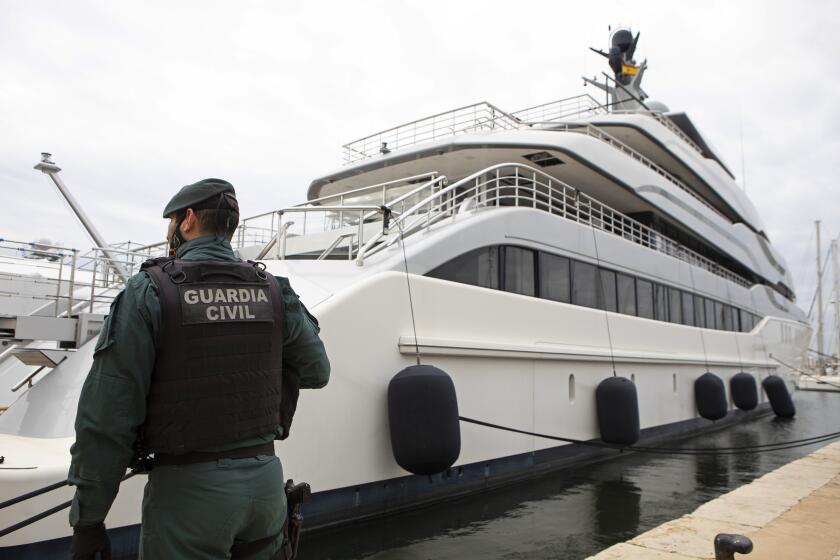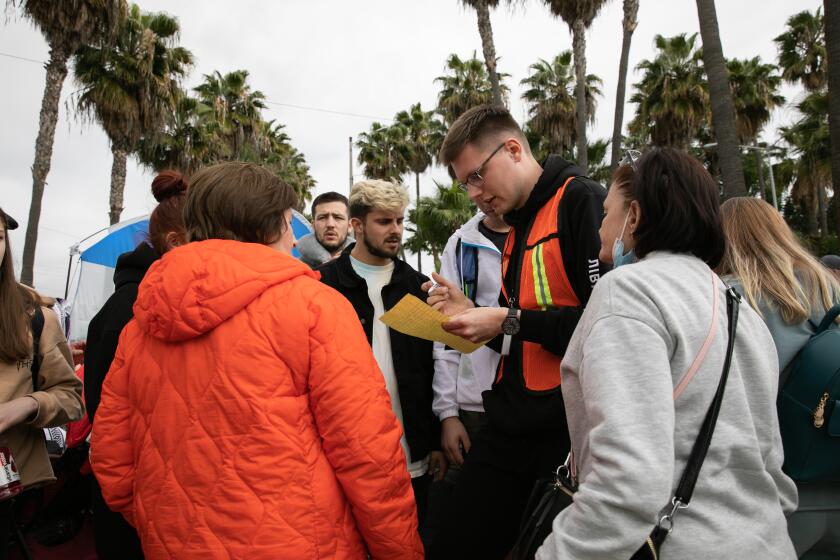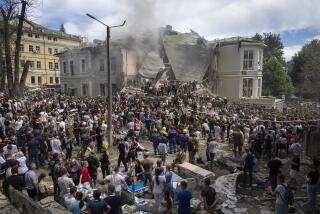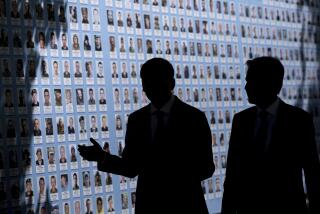In fiery speech, Ukraine’s Zelensky implores U.N. Security Council to hold Russia to account
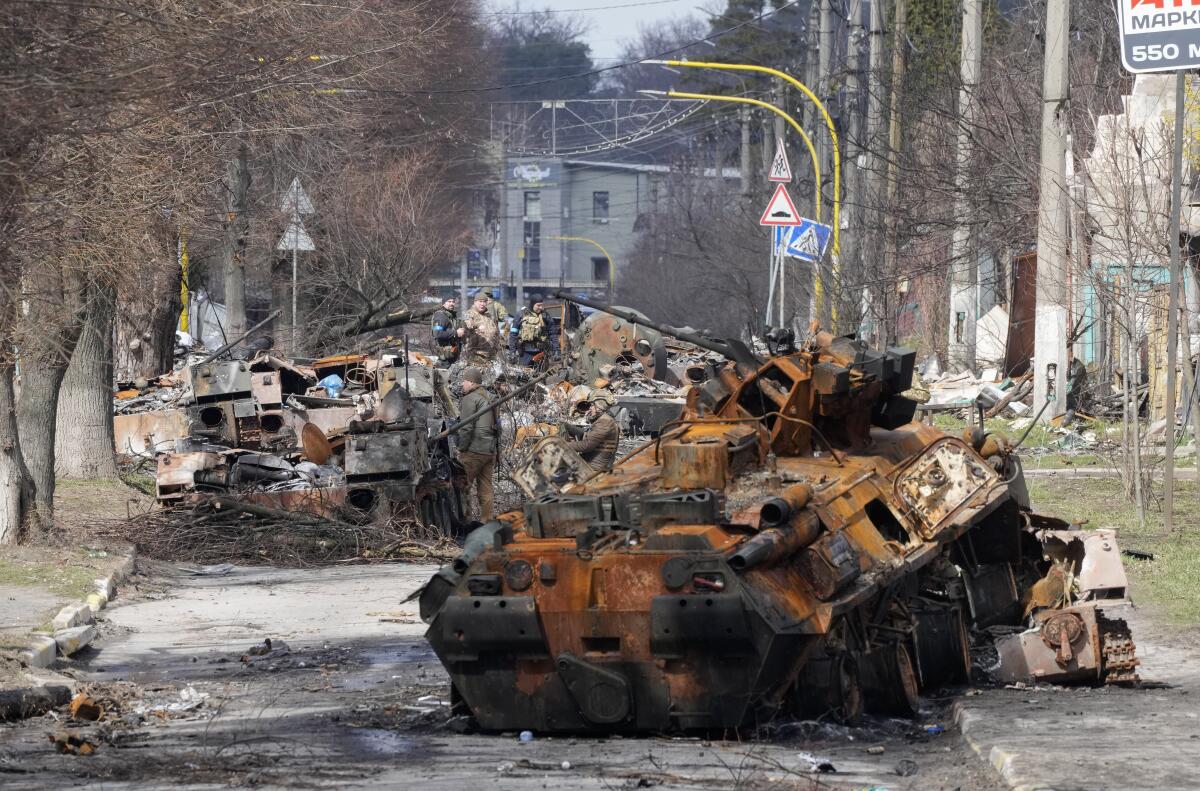
- Share via
KYIV, Ukraine — Ukrainian President Volodymyr Zelensky, in an impassioned address to the U.N. Security Council on Tuesday, likened perceived Russian atrocities in his homeland to Nazi war crimes, calling for Nuremberg-style tribunals to hold Moscow accountable.
“They shot and killed women outside their houses. They killed entire families, adults and children, and they tried to burn the bodies,” Zelensky said in a video appearance before the Security Council, a day after an emotional visit to the ravaged town of Bucha, outside the capital, Kyiv.
“They cut off limbs, slashed throats, raped women in front of their children,” the Ukrainian leader said in his most forceful excoriation to date of the Russian invasion.
In a perhaps risky strategy of sharply criticizing the body from which he is seeking help, Zelensky issued a stark challenge to world institutions such as the United Nations to make sweeping changes to the global security architecture, asking sardonically at one point: “Are you ready to close the U.N.?”
“It is obvious that the key institutions of the world … simply cannot work effectively,” said the 44-year-old president, who has won worldwide accolades for presiding over his compatriots’ fierce and sustained resistance to the Russian attempt to subjugate Ukraine.
Rescue efforts continued Monday outside Kyiv as Biden and European leaders called for swift action against Russia for civilian deaths.
Following a Russian pullback from areas around the Ukrainian capital, horrific images and footage have emerged in recent days from the once-placid Kyiv suburbs and other northern areas — bodies lining the streets, corpses with bound hands, the forlorn figure of a man shot dead, sprawled beside his bicycle. At least 410 bodies have been found, including many bearing signs of torture, Ukrainian officials say.
The small town of Borodyanka, about 15 miles northwest of Bucha, was reduced to ruins. Video showed multistory buildings along the main thoroughfare ravaged and burned out by airstrikes after Russian forces withdrew. Several apartment complexes had collapsed. Officials have said they fear hundreds of people in the town could be dead in the rubble.
More such harrowing scenes are likely to emerge, Zelensky said, as Ukrainian forces reassert control in northern areas previously under control of Russian troops, who are now redeploying and refitting for what Ukrainian and Western officials believe is a redoubled offensive in the country’s south and east.
“The world has yet to see what they have done in other occupied cities and regions of our country,” Zelensky said.
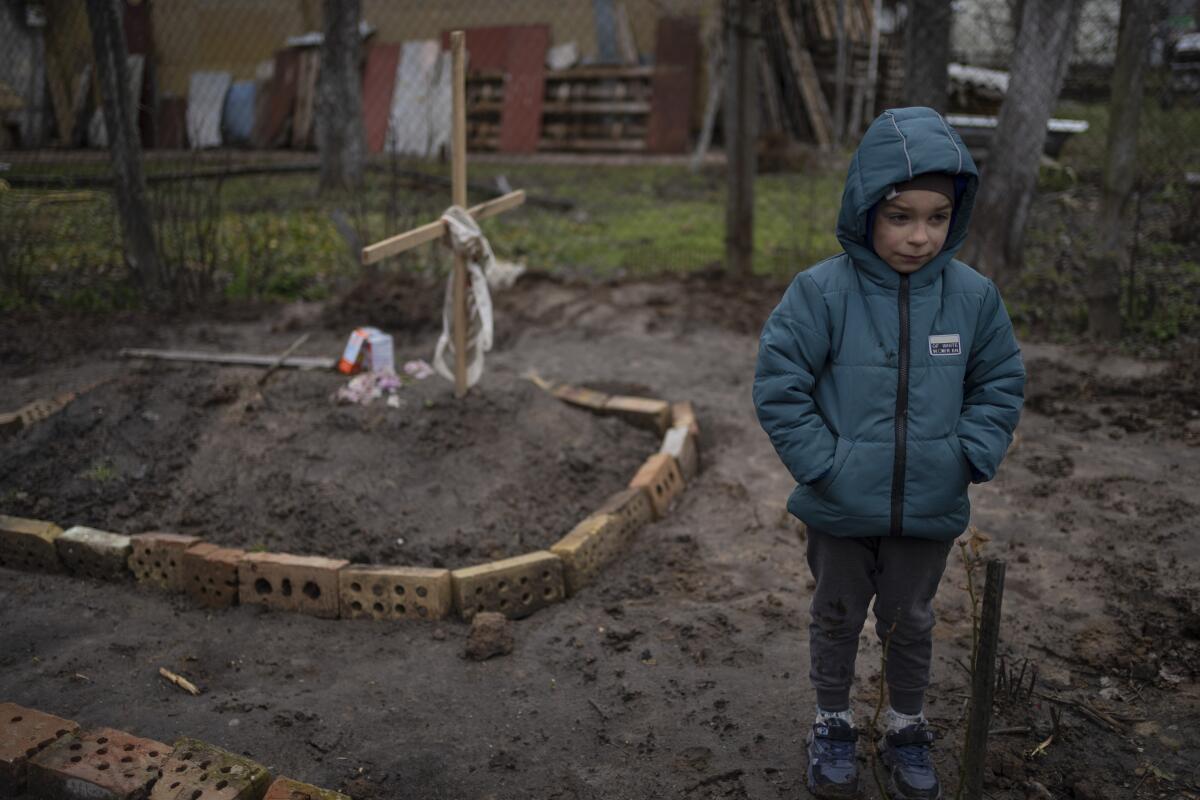
The alleged atrocities have set off a new wave of calls for a halt to the fighting and for broad new sanctions against Russia, including a proposal by the European Union’s executive arm for a ban on imports of Russian coal.
“It is more urgent by the day to silence the guns,” U.N. Secretary-General Antonio Guterres told the Security Council before Zelensky spoke, citing not only the devastation in Ukraine, but a rapidly developing food crisis in parts of the world as a result of the war.
Nearly six weeks into the war, Ukrainian and Western defense officials warned of a reinvigorated Russian assault in the country’s eastern industrial heartland and elsewhere.
A Ukrainian ambassador, and others, makes Germans reflect on their relations with Russia
“This is a crucial phase of the war,” NATO chief Jens Stoltenberg told reporters in Brussels in advance of a North Atlantic Treaty Organization ministerial meeting beginning Wednesday. U.S. Secretary of State Antony J. Blinken is scheduled to attend.
Despite a reprieve for Kyiv and surrounding areas, Ukraine’s military said Russian forces, largely repelled in the country’s north, were readying a fresh offensive in the eastern Donbas region and in southern Ukraine.
Underscoring the peril faced by humanitarian workers trying to ease desperate hardships in besieged areas, a senior Ukrainian official said a Red Cross team detained near the strategic southern port of Mariupol had been released. But tens of thousands of residents remained in danger in the encircled city.
The deputy Ukrainian prime minister, Iryna Vereshchuk, said more than 3,800 people — including more than 2,200 in private vehicles from Mariupol and Berdyansk — were evacuated through specially designated humanitarian evacuation corridors on Tuesday.
A convoy of seven buses and more than 40 private cars sent to evacuate civilians from Mariupol, however, was forced to return after encountering a blockade about 12 miles outside the city. Previous efforts have often been derailed by fighting and Russian shelling.
The U.S. government seized a yacht in Spain linked to Viktor Vekselberg, an oligarch with close ties to the Russian president.
Moscow has scoffed at the growing body of evidence that its occupying troops have targeted and tortured civilians, dismissing photos as staged and victim testimony as false.
“We continue to insist that all accusations against Russia, against Russian military, are not merely groundless, but a well-directed show,” Kremlin spokesman Dmitry Peskov told reporters Tuesday, according to Russian state media outlet Tass. “Nothing else but a tragic show.”
Blinken said Tuesday that atrocities committed in Bucha were not the work of a “rogue” Russian unit but part of “a deliberate campaign to kill, to torture, to rape, to commit atrocities.”
“The reports are more than credible,” he said to reporters traveling with him to Brussels, where he will meet with counterparts from NATO. “The evidence is there for the world to see.”
Blinken said the U.S. and other nations were working to collect the evidence to build a strong case against Russia.
The Pentagon announced Tuesday night that the Biden administration had authorized an additional shipment of military supplies — up to $100 million in Javelin anti-armor missile systems from existing Defense Department stockpiles, bringing the total U.S. security commitment to Ukraine to $1.7 billion since Russia invaded on Feb. 24.
The White House said in a statement Tuesday that the U.S., the United Kingdom and Australia agreed on bolstering their cooperation on developing new hypersonic weapons that can fly at 10 times the speed of sound and evade missile defense systems.
Meanwhile, Army Gen. Mark A. Milley, chairman of the Joint Chiefs of Staff, told Congress that the U.S. should seek to develop more bases in Eastern Europe, where NATO allies fear further Russian aggression.
“My advice would be to create permanent bases but don’t permanently station, so you get the effect of permanence by rotational forces cycling through permanent bases,” he said Tuesday at a defense budget hearing.
“I believe that a lot of our European allies, especially those such as the Baltics or Poland and Romania, and elsewhere — they’re very, very willing to establish permanent bases,” Milley said. “They’ll build them; they’ll pay for them.”
Amid the growing international outcry, any call to action by the Security Council is all but certain to be blunted by permanent members China and Russia. In an address to the Security Council, China’s ambassador to the U.N., Zhang Jun, said Tuesday that the images from Bucha were “very disturbing” but that independent investigators must verify the facts.
“Humanitarian issues should not be politicized,” he said.
The White House is set to announce Wednesday a new round of sweeping sanctions against Russia, according to a source familiar with the announcement. The U.S., in coordination with the Group of Seven and the European Union, is expected to ban all new investment and increase economic penalties on financial institutions and state-owned enterprises in Russia in a bid to “degrade key instruments of Russian state power, impose acute and immediate economic harm on Russia and hold accountable the Russian kleptocracy that funds and supports Putin’s war.”
On Tuesday, more European Union countries — including Italy, Denmark, Portugal, Spain and Sweden — joined France and Germany in announcing or carrying out expulsions of dozens of Russian diplomats over the mounting proof of atrocities by Moscow. The Kremlin warned there would be “symmetrical” diplomatic retribution.
In a signal of European solidarity, Ursula von der Leyen, the European Commission president, is to travel to Kyiv this week, her spokesman said. She is to be accompanied by the top European Union diplomat, Josep Borrell.
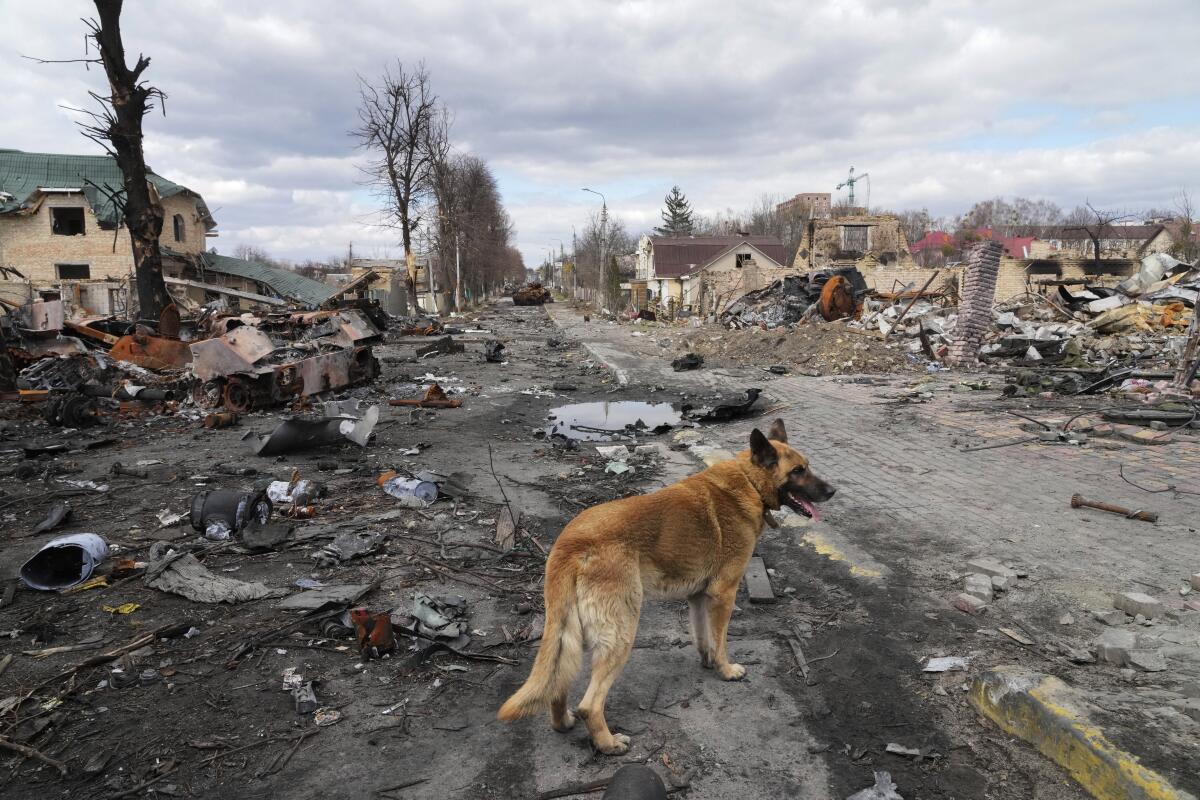
Those war-zone talks with Zelensky would be the latest in-person visit by high-ranking European officials since the invasion began Feb. 24. Last week, European Parliament President Roberta Metsola traveled to Kyiv bearing a “message of hope.” Last month, leaders from Poland, Slovenia and the Czech Republic took a risky train ride to Kyiv to express their support.
The Ukrainian capital, while seemingly out of immediate danger of a full-scale assault, still has the feel of a city ready for war. Most shops are closed, but residents walk their dogs or go out for a jog in the late-winter chill, the weather hardly betraying the arrival of spring.
Residents have become accustomed to the matrix of checkpoints that block entrances and exits to neighborhoods — piles of sandbags covered in camouflage netting and some shredded fabric for additional concealment.
Breaking News
Get breaking news, investigations, analysis and more signature journalism from the Los Angeles Times in your inbox.
You may occasionally receive promotional content from the Los Angeles Times.
Burly troops in winter gear and body armor, toting assault rifles, check drivers’ IDs, as there is considerable concern about Russian infiltrators and saboteurs. On broad downtown boulevards, traffic appeared relatively light Tuesday morning, but vehicles lined up at checkpoints on the city’s periphery.
In Ukraine’s south, Doctors Without Borders said that a four-member team met Monday with health authorities in an oncology hospital in the port city of Mykolaiv when the facility came under fire.
“Several explosions took place in close proximity to our staff over the course of about 10 minutes,” Michel-Olivier Lacharité, the group’s head of mission in Ukraine, said in a statement Tuesday. The team members were able to take cover and were not hurt, Lacharité said, but the windows of their vehicle were blown out, and as they left they saw injured people and at least one dead body.
A regional pediatric hospital, about 330 yards away in a residential area in the east of the city, was also hit.
“Bombing such a large area within a residential neighborhood in the middle of the afternoon cannot but cause civilian casualties and hit public buildings,” Lacharité said. “In the past two days, three hospitals in Mykolaiv have been hit by airstrikes.”
In the northeast, Oleh Syniehubov, the military governor of Ukraine’s Kharkiv region, said Tuesday that Russian forces had killed six people and injured eight others in Kharkiv and Chuhuiv. “Over the past day, the occupiers have struck 54 strikes from various long-range weapons: artillery strikes, mortar and tank shelling, MLRS shelling,” he said in a statement on Telegram.
In the country’s east, Western analysts and officials have said they expect Russian forces to push to expand beyond the territory where the Kremlin has fomented an 8-year-old separatist conflict.
The Ukrainian military’s general staff wrote on Facebook that, in the Donetsk and Luhansk regions, Russian forces were trying to take control of the cities of Popasna and Rubizhne, while continuing to lay siege to Mariupol, whose capture would be key to establishing a land bridge with the Crimean peninsula, which Russia seized in 2014.
“The enemy is regrouping troops and concentrating its efforts on preparing an offensive operation in the east of our country,” the statement said, adding that the objective was “full control over the territory of Donetsk and Luhansk regions.”
Near the San Ysidro Port of Entry, volunteers are working around the clock to support Ukrainian families and organize them for Customs and Border Protection to process.
British military intelligence said in an assessment Tuesday that Ukrainian forces had reasserted control of some crucial northern terrain, including areas around the city of Chernihiv and north of Kyiv, although it said low-level fighting might persist in some of those areas.
Many of those Russian units, however, will be unable to redeploy to eastern Ukraine until they have undergone significant refitting, the assessment said.
With nearly a quarter of Ukraine’s population displaced by war, and more than 4 million seeking safety beyond its borders, the biggest movement of refugees seen within Europe since World War II has prompted action from some unusual quarters.
In scenes carried live Tuesday by Japan’s national broadcaster NHK, 20 Ukrainian refugees arrived from Poland on a special flight arranged by the foreign minister in a high-profile show of support. There are already about 400 Ukrainian refugees in Japan.
McDonnell reported from Kyiv, King from Budapest, Hungary, and Jarvie from Atlanta. Times staff writers Tracy Wilkinson and Courtney Subramanian in Washington contributed to this report.
More to Read
Sign up for Essential California
The most important California stories and recommendations in your inbox every morning.
You may occasionally receive promotional content from the Los Angeles Times.
